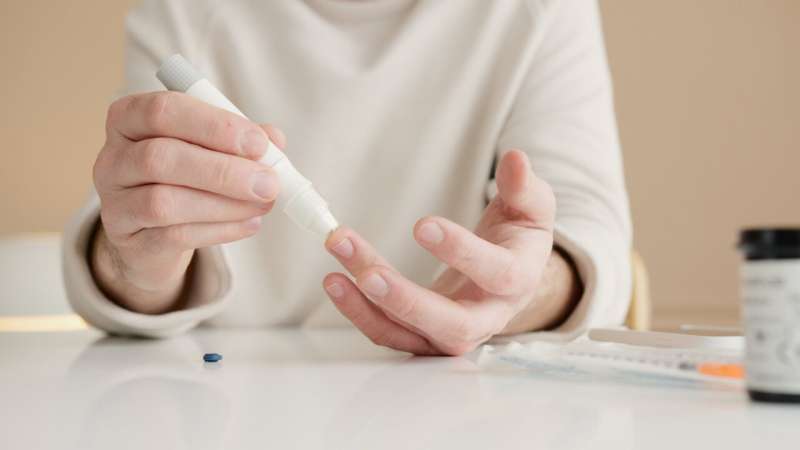This article has been reviewed according to Science X's editorial process and policies. Editors have highlighted the following attributes while ensuring the content's credibility:
fact-checked
peer-reviewed publication
trusted source
proofread
Weekly insulin injections could be as effective in diabetes management as daily injection regimes

Insulin icodec, a once-weekly basal injection to treat type 1 diabetes, has the potential to be as effective in managing the condition as daily basal insulin treatments, according to research from the University of Surrey. The results of the year-long phase 3 clinical trial could revolutionize the future of diabetes care and help millions of people better manage their condition.
During this pioneering study, scientists across 12 countries at 99 sites, led by Professor David Russell-Jones from Surrey, tested the efficacy and safety of a weekly basal injection of icodec (a long-lasting type of insulin) and compared it to a daily basal injection of insulin degludec in adults with type 1 diabetes. Short acting insulin to cover meals was used in both groups.
The results of the trial were published in the journal The Lancet.
Professor David Russell-Jones, professor of diabetes and endocrinology at the University of Surrey and a Consultant at the Royal Surrey Foundation Trust, said, "Many people find managing a long-term condition such as diabetes very difficult and report missing vital insulin injections.
"Missed injections can affect glycemic control, and a lack of consistency in the treatment has been linked to increased rates of diabetic ketoacidosis, a serious complication of the condition that can be life-threatening. Reducing insulin injection frequency could lessen the burden of treatment for some people with the condition and improve their glycemic control."
Type 1 diabetes occurs when the body cannot produce enough of the hormone insulin, causing the level of glucose (sugar) in the blood to become too high, leading to an increased risk of developing heart, eye, and kidney disease.
To learn more about the efficacy of icodec, scientists recruited 582 participants with type 1 diabetes. Participants were split into two groups; the first received once-weekly injections of icodec (700U/ml), and the second received daily injections of degludec (100 U/ml), both in combination with aspart, a short-acting insulin at mealtimes.
After 26 weeks, scientists identified HbA1C (a protein within red blood cells with glucose attached to it and the universal marker for overall diabetes control) levels in those who had taken icodec had decreased from a mean of 7.59% at baseline to an estimated mean of 7.15%, and for degludec, the mean had decreased from 7.63% to 7.10%. The estimated treatment difference between them being 0.05%, confirming the non-inferiority of icodec to degludec, but with a significantly reduced injection frequency for patients to manage.
Scientists did also identify higher rates of hypoglycemic episodes (abnormally low levels of glucose in the blood) in the icodec group compared to degludec. However, despite the higher levels in the icodec group, scientists noted that incidences were low in both groups, with most episodes only requiring oral carbohydrate administration. For icodec, time below 3.0 mmol/L was at the threshold of the internationally recommended targets during weeks 22–26 and below recommended targets during weeks 48–52.
Professor Russell-Jones added, "What we have found is that once-weekly icodec injections showed non inferiority to once-daily injections of degludec in reducing HbA1C after 26 weeks. Although there is a slightly higher rate of hypoglycemia under this regime, we found this could be easily managed. We've concluded this new insulin may have a role in reducing the burden of daily basal injections for patients managing type 1 diabetes.
"Our findings are very promising, but further analysis of continuous glucose monitoring data and real-world studies are needed."
More information: David Russell-Jones et al, Once-weekly insulin icodec versus once-daily insulin degludec as part of a basal-bolus regimen in individuals with type 1 diabetes (ONWARDS 6): a phase 3a, randomised, open-label, treat-to-target trial, The Lancet (2023). DOI: 10.1016/S0140-6736(23)02179-7



















